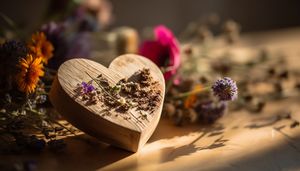Depression is a psychological disease which results in feelings of hopelessness and despair which disrupt daily activities like work, sleeping and eating. Herbal medicines offer natural solutions which have proven very successful against this form of psychological disease.

Certain nutritional and herbal supplements may help ease depression-related symptoms; however, these products shouldn't be seen as replacements for medication prescribed to treat depression without first consulting with your healthcare provider.
1. St. John’s Wort
St. John's Wort (Hypericum perforatum) is a herb that can be used to treat depression.The main ingredients are hyperforin and hypicin. additional DNA elements could function in the same way as antidepressants.
St John's Wort has proven itself an effective antidepressant drug in clinical trials worldwide for treating mild to moderate depression, according to Cochrane Systematic Review9 and other research studies. St. John's Wort may even outperform placebo when treating depression of similar intensity levels.
St John's Wort should only be taken for more than several weeks at once and stopped abruptly; otherwise it can cause withdrawal symptoms as well as increase both heart pressure and blood pressure to dangerously high levels. Furthermore, take it with food containing the chemical tyramine such as aged cheeses, salted meats or sauerkraut to minimize risks while increasing effectiveness of use.
2. Lavandula angustifolia
This aromatic plant, best-known for its essential oil, has recently been discovered to possess antidepressant effects and promote feelings of serenity while improving sleep quality and treating anxiety-related disorders often linked to depression. Chemical compounds found within its leaves such as Acetate of Linyl Acetate and Linalool possess sedative qualities which relieve symptoms by altering neurotransmitter levels within the brain thus alleviating depression symptoms Khameera Gaozaban Ambri Jawahar.
In this research project, an experimental double-blind design with posttest and pretest controls to assess the efficacy of L. angustifolia against Citalopram was employed. People suffering mild to moderate depression participated in two treatment groups; standard receiving 20 mg daily of Citalopram while experimental had to combine this dosage with herbal syrup containing L. angustifolia as well as D. Ruyschiana twice per day plus two units each of L. angustifolia and D. Ruyschiana twice per day in addition to receiving daily Citalopram; both groups received 20 mg twice per day combined treatments; all groups received 20 mg twice per day combined treatments total treatment amounts;
Researchers discovered that herbal syrups significantly improved patient scores on BDI tests when compared with placebo pills and found promising results from this research project. Therefore, researchers concluded that herbs could be combined with chemical antidepressants in order to increase efficiency while simultaneously decreasing adverse side effects.
3. Valeriana officinalis
Valerian root, often referred to as Nature's Valium(r), is an herbal sleep aid and anxiety reliever commonly taken capsule tincture form or tea form. However, those with sensitive digestive systems should avoid valerian as it could cause stomach upset; additionally children aged under 7 must not consume valerian due to its potential sedative properties.
herbal supplements appear promising as treatments for depression; however, more research needs to take place prior to any definitive conclusions being reached. Further, even though herbal treatments like St John's Wort or Chinese Ginkgo Biloba may appear harmless upon first glance, additional studies must first take place and their effects must be carefully considered; some have side-effects including stomach irritation and even toxic ones at higher dosage levels; St John's Wort may interact with medications used for blood thinning or organ rejection following transplant procedures so any herbal remedy should only be consumed after consultation with healthcare provider prior to making decisions or making assumptions alone!
4. Chamomile
While Herbal Medicine have increasingly become an attractive component of mental health treatments such as therapy or medication, care must still be taken when choosing products carefully as herbal medication does not fall under as stringent oversight as pharmaceutical drugs; certain herbs could even interact negatively when combined with prescription medication.
St. John's Wort (Hypericum perforatum) stands out among these supplements as an especially powerful natural antidepressant; research studies have confirmed its efficacy as equivalent to antidepressant prescription. While its usage should not interfere with certain drugs that reduce blood flow or birth control pills or HIV/AIDS treatments and medications prescribed by healthcare practitioners, its usage must still be done carefully as there could be negative interactions.
Chamomile can aid the treatment of depression through its many compounds which impact mood and anxiety levels, particularly its oils that act as sedatives to ease tension and anxiety. Furthermore, its efficacy was confirmed via randomized trial that showed reduced GAD-7 scores.
